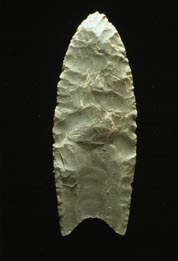Top Qs
Timeline
Chat
Perspective
Dent site
Clovis culture archeological site in Colorado, US From Wikipedia, the free encyclopedia
Remove ads
The Dent site is a Clovis culture (about 11,000 years before present) site located in Weld County, Colorado, near Milliken, Colorado. It provided evidence that humans and mammoths co-existed in the Americas. The site is located on an alluvial fan alongside the South Platte River.[1]


Image courtesy of the Virginia Dept. of Historic Resources.
Remove ads
Discovery
Summarize
Perspective
The Dent railroad depot was once located next to the South Platte River southeast of Milliken, Colorado. Railroad tracks serving the depot ran over eroded Ice-Age terrace remnants south and west of the river’s modern floodplain. After heavy spring rains in April, 1932, railroad foreman Frank Garner noticed very large animal bones eroding from a deep gully draining through a low sandstone bluff west of the tracks. Word of the discovery reached Regis College professor of geology, Jesuit priest Conrad Bilgery, through one of his students, son of the Dent Depot manager. In September, 1932, Father Bilgery excavated some of the bones with his students, identifying them as mammoth. He then contacted Colorado Museum of Natural History (now Denver Museum of Nature & Science) paleontology curator Jesse Figgins about the find. Figgins delegated further exploration of the mammoth remains to museum staff member, Frederick Howarter, who conducted excavations in June and July, 1933, with museum volunteers, trustees, Father Bilgery, and his Regis College students.[2]
The Dent site, in Weld County, Colorado, was a mammoth fossil excavation for most of 1932. The first Dent Clovis point was found November 5, 1932 and the in situ point was found July 7, 1933. [3][4]
Remove ads
Findings
Clovis culture
The Clovis culture (about 13,300 - 12,900 calendar years before present)[5] used projectile points in hunting. Previous to the use of projectile points, indigenous people used a tool-kit like that used in Asia, which included large axe cutting tools, scrapers, blades and flake tools. The Clovis point was the first use of large, symmetrical and fluted projectile points.[6][7][nb 1]
Mammoth bones
Mammoth bones and what were later called Clovis points[nb 2] were found at the Dent site in 1932. The site was notable for both the presence of the projectile points larger than the known Folsom points and one of the first direct pieces of evidence that man and mammoth co-existed in the Americas.[10][nb 3] The mammoth killed were not part of a family group, as originally hypothesized, and were not related to other mammoth killed at Clovis sites such as Blackwater, New Mexico and Miami, Texas.[11]
Remove ads
Excavations
See also
- Game drive system
- Manis Mastodon site – dated to around 14,000 years old
Notes
- Clovis culture was considered the first culture to use projectile points to hunt on the North American continent. Since then, a pre-Clovis site was found in Manis, Washington, that found use of projectile points to hunt mastodons.[8]
- The Burnet Cave article identifies itself as the first place that Clovis points were located.
Remove ads
References
Further reading
Wikiwand - on
Seamless Wikipedia browsing. On steroids.
Remove ads
